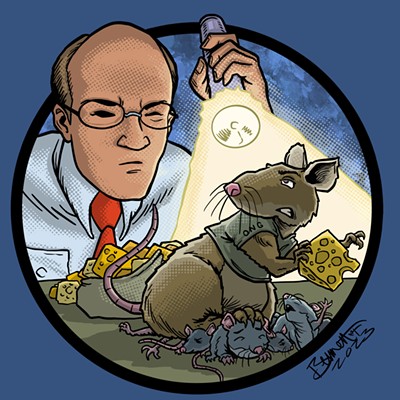What creatures might one never spot but sound like a million smoke detectors with their batteries running out? That would be the "Cajun chorus frog," a newly discovered species native to eastern Oklahoma.
Former Oklahoma Gazette intern Althea Peterson reported the "ribbiting" story in the Tulsa World (she done us proud!).
Its discovery announced in January, the "Cajun chorus frog," according to Peterson, is only about an inch long, and, per CFN intern Bucky's research, light green, with splotchy darker stripes and big round eyes. I.e., cute. Until it makes noise, that is, which turns out to be "a deafening chirp when joined by a chorus of others," according to the story.
Four scientists first found the species in 2001, during a frog hunt after a heavy rain outside Baton Rouge, La. In what sounds like the opening to a Southern, slow-burning thriller, "The frogs were calling like crazy that night," co-discoverer Emily Moriarty Lemmon said. "All of a sudden, this light came on in a house across the street. "¦ Someone came stomping out saying, 'What're you all doing over here?'"
When the foursome told the man they were looking for frogs, and held up a few they'd found in a ditch, the man, confused, reportedly replied: "What you all doing that for? They're too small to eat!"
We're kinda glad that conversation took place in Louisiana and not Green Country. At any rate, the accomplishment is one that fellow discoverer Joseph Collins, director of the Center for North American Herpetology, said gave him a measure of self-meaning.
"It's what we live for as biologists " new discoveries," he said.
The best time to find the species in eastern Oklahoma is about now " breeding season " when the frogs make their way to ponds and chirp their hearts out en masse. The sound?
"Take a metal comb; run your finger along it," Moriarty Lemmon said.
Or, per Collins, as Peterson paraphrased, the pitch of the "picking sound" slowly increases, drawn out "like a Southern drawl."
In other words, if you hear them, you'll know it. If you eat them, too: "They probably taste bitter," Moriarty Lemmon said. No croak.















